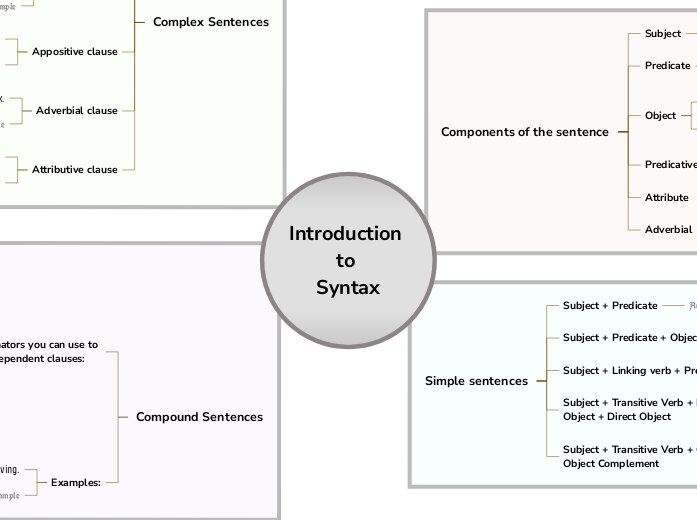Introduction to Syntax
Use this template to learn about the syntax and understand phrase components and subordinate clauses. The components of the sentence are subject, predicate, object, predicative, attribute, and adverbial. These are used to form different types of sentences: simple sentences, compound sentences, and complex sentences.
Introduction
to
Syntax
In linguistics, syntax is the set of rules, principles, and processes that govern the structure of sentences in a given language, usually including word order.
Compound Sentences
A compound sentence is a sentence that has at least two independent clauses joined by a comma, semicolon or conjunction. An independent clause is a clause that has a subject and verb and forms a complete thought.
Examples:
Create your own compound sentences, using the coordinators above.
Tim is tired, yet he's driving.
Coordinators you can use to
join independent clauses:
When independent clauses are joined with coordinators (also called coordinating conjunctions), commas and semicolons, they do more than just join the clauses. They add meaning and flow to your writing.
Other
So
Yet
Or
But
Nor
And
For
Complex Sentences
A complex sentence is a sentence that contains an independent clause and one or more dependent clauses.
An independent clause can stand alone as a sentence, but a dependent clause even though it has a subject and a verb cannot stand alone.
Attributive clause
Attributive clauses serve as an attribute to a noun (pronoun) in the main clause. This noun or pronoun is called the antecedent of the clause.
He went to the next house, which stood in a small garden.
Adverbial clause
An adverbial clause is a group of two or more words that function as an adverb in a sentence.
We couldn't park anywhere near the park.
Appositive clause
An appositive clause follows another noun or noun phrase in apposition to it; that is, it provides information that further identifies or defines it.
Chopin, a Polish composer, was one of the most celebrated pianists of his day.
Subject clause
The subject clause is a dependent clause that acts as a subject.
We like the person who teaches us German.
Predicative clause
A predicative clause may be introduced by conjunctions - that, whether, whether... or, as, as if, as though, because, lest, the way - or connectives.
The latter may be conjunctive pronouns - who, whoever, what, whatever, which - or conjunctive adverbs - where, wherever, when, whenever, how, why.
The question is whether we can manage without him.
Object Clause
The object clause is a phrase on which a verb performs an action. It falls at the end of a sentence, and is governed by a verb or a preposition.
We didn’t realize she was so ill.
Simple sentences
Subject + Transitive Verb + Object + Object Complement
See the example below and try to create your own simple sentences.
Tim is driving the red car.
Subject + Transitive Verb + Indirect Object + Direct Object
See the example below and try to create your own simple sentences.
Tim is driving the car with his mother.
Subject + Linking verb + Predicative
See the example below and try to create your own simple sentences.
Tim is the driver.
Subject + Predicate + Object
See the example below and try to create your own simple sentences.
Tim drives the car.
Subject + Predicate
See the example below and try to create your own simple sentences.
Tim drives.
Components of the sentence
Adverbial
An adverbial is an individual word (that is, an adverb), a phrase, or a clause that can modify a verb, an adjective, or a complete sentence.
Attribute
The attribute is defined as a quality or characteristic of a person, place or thing.
Predicative
The predicative is defined as an adjective or noun forming or contained in the predicate.
Its main trait is that it serves to express a property that is assigned to a 'subject'.
For e.g.: The dog is old.
Object
Traditional grammar defines the object in a sentence as the entity that is acted upon by the subject.
Indirect object
The indirect object identifies the person/thing for whom/which the action of the verb is performed.
The indirect object is usually a person or a thing.
Direct object
The direct object is the receiver of the action mentioned in the sentence.
Predicate
The predicate of a sentence is the part that modifies the subject in some way. Because the subject is the person, place, or thing that a sentence is about, the predicate must contain a verb explaining what the subject does and can also include a modifier.
Subject
The subject of a sentence is the person, place, thing, or idea that is doing or being something. You can find the subject of a sentence if you can find the verb.
Ask the question, 'Who or what 'verbs' or 'verbed'?' and the answer to that question is the subject.
Add example








